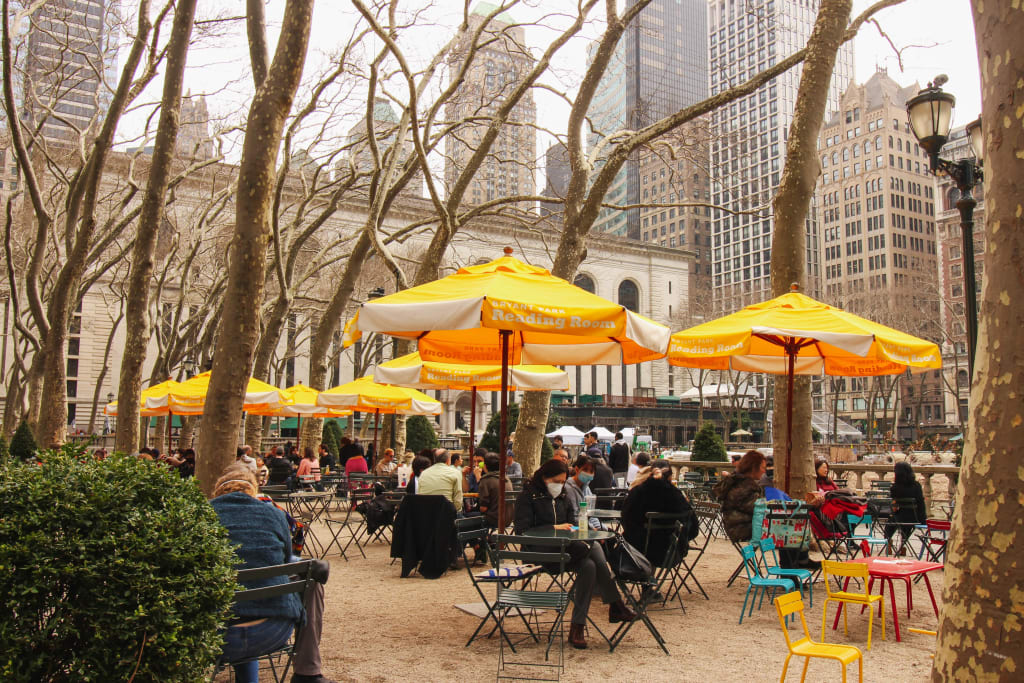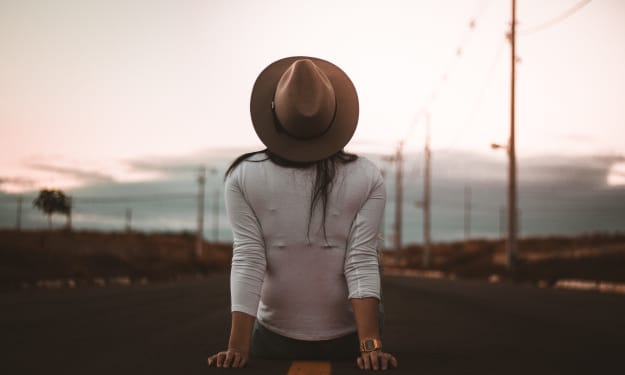
Carmel bites down on her ballpoint pen, cracking the purple cap, and scowls at her crossword puzzle. Sultan who captured Jerusalem in 1187. She looks up and surveys Bryant Park. Hints of green dapple the brown trees, a small crowd gathers around the Wafels and Dinges food cart, early signs of life returning to the trees and to the city. Floating along with the cacophony of cars and rap music and shouting is a voice chanting to the melody of “Frere Jacques.” The singer, whose voice is strong and resonant, replaces the lyrics with, “Put your mask on. Put your mask on. Don’t be rude. Don’t be rude.” Carmel scans the park for the source of the singing and smiles at the young woman with long braids, dressed and skipping like Dorothy in The Wizard of Oz. Ordinarily, Carmel would consider such a person an annoyance. Today, though, Carmel feels comforted by this nutty return to normalcy.
The voice grows louder and Carmel wonders if Dorothy is an out-of-work performer. She could be killing time until the theaters and clubs reopen; her voice is that good. A skateboarder wearing a Minnie Mouse costume, holding the mouse head in her hands, whizzes by and a shih-tzu walking with an elderly man strains to give chase. Dorothy stops next to the Benito Juarez Monument, ten feet from Carmel. She pushes her face shield to the top of her head, takes a long swig from a water bottle, pulls the shield back down and chants in a tune of her own making, “Black Lives Matter,” “Me Too,” “Ban Fur,” “Don’t Be a Prick. Get the Stick.”
Carmel moves on to another crossword clue—virtuosic improvisation—allowing Dorothy’s voice to morph into white noise. She fiddles with her X’s and O’s facemask and takes a sip of coffee.
“Hey. Put your mask on,” Dorothy says.
Carmel peers over her tortoiseshell sunglasses, taking in Dorothy’s outfit, a jean vest worn with a short white and teal gingham dress. A large basket is hooked in the crook of her elbow. Carmel averts her eyes as the girl weaves around the metal tables and chairs and approaches her. She pulls her mask back up and fumbles around her pockets, searching for her phone and earbuds. Instead she finds a lint-covered twenty-dollar bill and a small bottle of hand sanitizer.
Dorothy parks herself at a table a good six feet away and repeats, “You’re in a public park. Put your mask on.”
“It’s on. I pulled it down for one second. One sip of coffee.” Carmel holds up the blue and white paper cup to illustrate. She could kick herself for sounding defensive.
“One world; many masks. We’re all in this together,” Dorothy’s voice lilts. She points at Carmel’s coffee. “No judgment, but that paper cup’s gonna end up in landfill and plastic lids are choking sea turtles. There’s an entire island made of plastic floating around in the Pacific.” Dorothy whistles, drumming her fingers on the metal table. She stares at Carmel. “You vaccinated?”
Carmel feels a whoosh of adrenaline and her throat tightens. Her coffee cup shakes in her hand enough that she has trouble setting it on the table. She has no idea why this young woman is eliciting such a reaction from her. “I am. Not that it’s any of your business.”
“Ha! Let me see your card.”
Carmel, unable to tell if Dorothy is joking, blinks behind her sunglasses. She’d been one of the first people she knows to get vaccinated and had felt guilty that she’d received both doses before her eighty-six-year-old neighbor received one. Back then, she was selfish for getting the vaccine. Now she’d be selfish if she didn’t. It’s getting harder to keep up with the shifting narratives.
A woman wearing a leopard print sweater hurries by and lets out a yelp when Dorothy bellows in a false baritone, “Ban fur.”
Selfish, either way. Carmel’s face flushes. She thinks of the full-length sable she wore for years, back in the Nineties, remembering the grin on Bobby’s face as he draped the coat over her shoulders. He’d insisted she wear it when they made love that night. She was so young, fresh out of college, and he, a few years older, was already making more money in one year than her parents made in ten. How many times had Carmel worn that sable to the 104th Floor of the South Tower at the World Trade Center to meet Bobby for dinner? After 9/11, she donated his business suits, put the diamond ring in the bank safe deposit, and packed the fur coat she’d never wear again in a box without a lid. When she Marie Kondo-ed her apartment several years ago she considered getting rid of the coat, but she couldn’t bring herself to let it go even though it no longer met the minimum requirement for keeping it. It did not spark joy.
“Fur is for monsters,” Dorothy says.
For an instant, Carmel is convinced Dorothy can read her thoughts. “I don’t wear fur.” Carmel’s staccato voice punctuates every word.
“Of course you don’t. Wearing fur while not wearing a mask… I’d have to make a citizen’s arrest.”
Carmel can’t decide if Dorothy is smiling or smirking. She wants to slap Dorothy, slap away the aching image of Bobby as a forever young man reduced to ashes, indistinguishable from the ashes of thousands of others. There was no way to put him to rest. Carmel flutters her round blue eyes and looks away. She knows she could get up and leave, allowing Dorothy to target some other fool. But like that day she sat transfixed in front of her TV, watching the second plane fly straight into the South Tower, she cannot make herself move away.
The sun has slipped behind a bank of gray clouds and the wind has picked up. Entire floors of the office buildings that surround the park are dark. We survived then and we’re surviving now. Not all of us. Me. I’m still here. Still holding on, twenty years later. Carmel doesn’t know if her choice not to let go of irreplaceable Bobby is out of love or fear or something else. Exhaustion, lack of imagination?
“Listen, Dorothy, or whoever you are,” Carmel says, “I’m just like everyone else here, trying to make the best of a mostly beautiful day in a mostly shitty life. So take your preachy jokes—and, yes, you are judgmental—and get away from me.”
Dorothy glances around the park, as if suddenly self-conscious. “Okay. Okay. Calm down,” she says. She wipes the fog from her shield. “I don’t know why you’re so upset. I’m just being...”
“You’re being a nuisance.” Carmel doesn’t look at Dorothy. She keeps her gaze on the blossoming London plane trees. She tries to remember the proverb—just when it seems the tree is dead, it springs back to life—and the other one about how lovely it is to let dead things go. She startles out of her reverie when Dorothy leans toward her, breaking the six-foot invisible barrier.
“Sorry,” Dorothy whispers. “I’m always… I really didn’t mean to…” She crosses one leg in front of the other and slowly spins around. When she’s facing Carmel again, she says, “By the way, I love your hair. If I had a face like yours, I’d wear my hair short too.”
That pixie cut is perfect for your beautiful face.
It had been the first thing Bobby said to Carmel the night they met in a bar on Avenue A. Back then her hair was still natural, a rich honey brown. She fingers her much lighter hair now. She squeezes her eyes behind her big sunglasses and waits for the wave of despair to pass. She smiles, but winces when she hears herself say in a treacly voice, “You absolutely could wear your hair like this.”
“Thank you,” Dorothy’s smile, Carmel can see, is genuine. Dorothy crosses her legs again and twirls in the opposite direction, taking tiny steps, as if giving herself time to think. “I want to show you something.” She steps closer and dumps out the contents of her basket on Carmel’s table. Mixed in with a pile of “BLM” and “Me Too” and “Stay Safe, Stay Home” buttons are others bearing a hand-drawn raccoon lying on its back with X’s over its eyes. Captions, typed in blood red, accompany the drawings: “Fun Kills!” “Ban Fun!” “I Stand with L.A. In Banning Fun!”
Carmel pushes the sunglasses up on her head and frowns at the buttons. “L.A. banned fun? That’s an odd choice for a place known for entertainment.”
“Fur. It’s supposed to say fur.”
“Ohhh,” Carmel says, “That makes more sense.”
Dorothy stomps her black Mary Janes. “Of course it doesn’t make sense,” she says. “Torturing beavers and bunnies. Does that make sense? Do you understand that?”
Carmel feels as if she’s been slapped. She feels like slapping herself for falling for it, ignoring the obvious signs something is amiss here, and plunging into the turbulence of emotional instability. It’s always the same. The lulling with kindness and then—bam—the smackdown. Isn’t that the way it was with Bobby? A pleasant evening with friends in, say, an Alphabet City bar turned into a barrage of accusations and insults. Then, later, the bruises, the apologies in the form of over-the-top gifts. Since 9/11, the world has seemed somehow safer to Carmel. She wonders if what she misses most is the uncertainty—the Bobby rollercoaster—as opposed to Bobby himself.
Is that why she’s choosing not to walk away from this stranger in the park? After a year of Zoom classes and FaceTime parties and socially distanced hikes, is this stranger offering exactly the interaction she craves? No. Carmel reminds herself no matter how familiar, how cozy the chaos feels, she has to shake herself loose from its pall.
“What do you want from me? Money?” Carmel reaches into her pocket and pulls out the twenty-dollar bill. She thrusts it at Dorothy. “Here.”
Dorothy stares at the bill as if she’s never seen one before. Tears brim around her small, close-set eyes. “Why would you give me this?”
Carmel watches Dorothy’s expression turn childlike and thinks about the first session of therapy, months before the wedding, how she’d lied to the therapist and how he’d known she was lying. He’d told her that first day Bobby would never change because even he wanted to, which he clearly did not, he was incapable of it, because no one ever changes. The therapist, Dr. Cope—she’d chosen him from the directory her insurance company provided specifically because of his name—told her that she was destined to marry either her mother or her father or recreate the relationship they’d had with her own husband, and he’d said that fate was one hundred percent inescapable. Carmel had left his office and bought a fifth of Stoli, polishing off half of it straight from the bottle, on her walk home. In their last session, a year after 9/11, Dr. Cope said, by way of goodbye, “You are the siren call of damaged people. Accept that. Make resiliency, not happiness, your goal.”
Carmel shakes her head. “What do you want?” She pushes away from the table. “Never mind. I’m leaving.”
“Wait. Please don’t go,” Dorothy says, extending her hand, then stopping herself from actually touching Carmel. Up close, Carmel can see the braids, the outfit, the skipping are part of the illusion, but hands never lie. Dorothy is much older than she appears.
Dorothy picks up one of the buttons and shakes it at the Bryant Park Hotel, which is bathed in late morning amber light. She lobs the “FUN is torture” button into a garbage can a few feet away. “The printer thought my ‘Rs’ were ‘Ns’. Zillions of buttons. Ruined. Typical me; I couldn’t even get a bunch of buttons right.”
Carmel sinks back into her metal chair. Her sinuses are stuffed and heavy, her eyes burn and her temples throb. She feels as if she could lay her head on the cool metal table and sink into a deep sleep. She knows Dorothy is watching her, but she keeps her gaze fixed on the gold-trimmed hotel. Minutes pass before Carmel shifts her eyes down to the table.
“The BLM buttons look great,” Carmel finally offers.
Dorothy drops one button and picks up another that says, “Keep Your Paws Off My FUN!” “I tried to organize a protest. BLM. Daunte Wright. But then I thought of the millions of tortured animals slaughtered every year and they need a voice too. And renters. And mothers. So, I came up with ‘Omni Protest Day.’ We’d all gather here, today, and protest all the causes.” Dorothy turns her head away to wipe the tears from her mask. “The NYC Daily Event page on Facebook has over a hundred thousand followers and not one of them showed up today.”
Carmel considers the sort of person who browses Facebook pages in search of protests to attend. “Well, there is a pandemic...,” she says. “Speaking of Facebook… Do you know that young women actually kill themselves over social media posts?” Carmel wonders if there is a way to inject air back into Dorothy’s deflated frame. She sifts through the assorted buttons, trying to decide if a Sharpie could turn the “Ns” into “Rs.”
“People are in pain. Animals are in pain. There’s just too much pain in this world,” Dorothy says.
Carmel picks up a button, her eyes lighting up. “Which is precisely why it’s not a good idea to ban fun.”
Dorothy starts to say something, but stops. She erupts into giggles.
Carmel chuckles, too, and turns to two lithesome women in yoga pants walking too close together and says, “There’s a big FU in every FUR.”
Dorothy shouts, “Yes,” when Carmel tosses them a button and the women hurry away. The button clinks to the ground where a teenage boy on a scooter picks it up.
“Keep it,” Carmel says.
“Have two,” Dorothy says and tosses him another.
She and Carmel laugh as they run their fingers through the pile of buttons as if they were gold coins found in a pot somewhere over the rainbow. They pin buttons to their jackets; they toss buttons at each other. Carmel shouts, “Fun is murder,” to a young couple chatting into their individual phones. “Ban fun,” Dorothy screeches to a police officer walking with his K-9 partner. Their laughter grows stronger and louder, choking away their words, and their shoulders shake with mirth until tears stream down both of their faces.






Comments
There are no comments for this story
Be the first to respond and start the conversation.